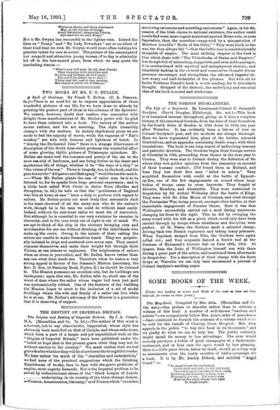TWO BOOKS BY MR. F. T. BULLEN.
A Sack of Shakings. By Frank T. Bullen. (C. A. Pearson. 6s.)—There is no need for us to express appreciation of these wonderful pictures of sea life, for we have done so already by printing the greater part of them in the columns of the Spectator. We cannot, however, doubt that readers who remember with delight these manifestations of Mr. Bullen's power will be glad to have them collected into a book. The variety of the author seems endless, and his art unerring. The style insensibly changes with the matters. In stately rhythmical prose we are made to feel the majesty of waves, while the vagaries of "Nat's monkey" are told with humour and lightness of touch. In "Among the Enchanted Isles" there is a strange illusiveness of description of the South Seas which produces the wonderful effect of some glowing idyllic picture of Titianesque splendour. Mr. Millen can make real the romance and poetry of the sea to the most sea-sick of landsmen, and can bring before us the inner and mysterious life of things, whether it be "the ways of a ship" or "the voices of the sea." There is tragedy, too, in the book, and for pure horror the "Alligators and Mahogany" would be hard to match. —When Mr. Bullen pleads the case of sailor men he is to be listened to, for he speaks from large personal experience ; and in a little book called With Christ in Sailor Town (Hodder and Stoughton, le. 6d.) he tells us that the "gentlemen of England who live at home at ease" have a duty to perform with regard to sailors. Mr. Bullen points out most truly that mercantile Jack is the least observed of all the many men who do the nation's work, though he is the man we could do without least easily. Indeed, without the merchant Bailor we must die of starvation. But although he is essential to our very existence he remains in obscurity, and in his case truly out of sight is out of mind. We are apt to think of the ship in the abstract bringing corn and merchandise for our use without thinking of the individuals who make up the crews. Owing to the nature of their calling the sailors are unable to make themselves heard. They are perpetu- ally isolated in ships and scattered over seven seas. They cannot organise themselves and make their weight felt through their Unions, as can miners or engineers. The helplessness of sailors when on shore is proverbial, and Mr. Bullen knows better than any one what their needs are. Therefore, when he makes a very strong appeal in favour of the Seamen's Mission (secretary, the Rev. D. Bee, 18 Stainsby Road, Poplar, E.) he should be listened to. The Mission possesses an excellent site, but its buildings are inadequate; upon this site, Mr. Bullen tells us, stood one of the worst of dens where the sailor whose wages had been just paid was systematically robbed. One of the features of the building the Mission hopes to erect is the inclusion of a set of model dwellings where the wife and family of a sailor can live while he is at sea. Mr. Bullen's advocacy of the Mission is a guarantee that it is deserving of support.






































 Previous page
Previous page